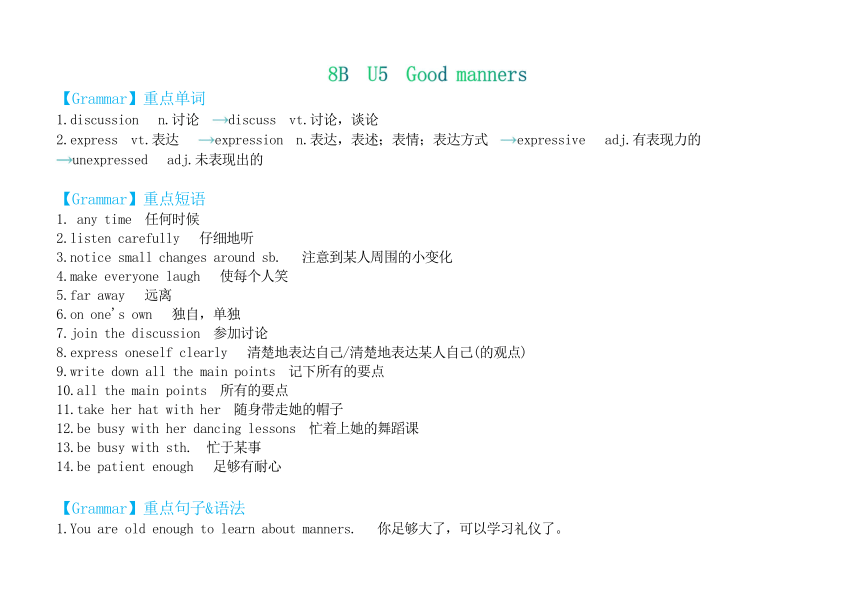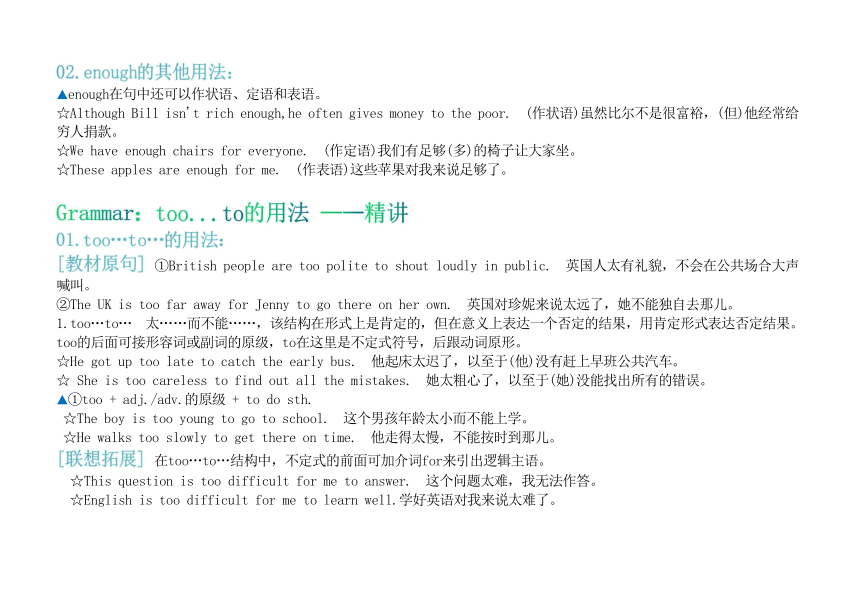牛津译林版八年级下册Unit 5 Good manners grammar 知识点讲义
文档属性
| 名称 | 牛津译林版八年级下册Unit 5 Good manners grammar 知识点讲义 |

|
|
| 格式 | docx | ||
| 文件大小 | 193.0KB | ||
| 资源类型 | 教案 | ||
| 版本资源 | 牛津译林版 | ||
| 科目 | 英语 | ||
| 更新时间 | 2024-04-09 00:00:00 | ||
图片预览



文档简介
8B U5 Good manners
【Grammar】重点单词
1.discussion n.讨论 →discuss vt.讨论,谈论
2.express vt.表达 →expression n.表达,表述;表情;表达方式 →expressive adj.有表现力的
→unexpressed adj.未表现出的
【Grammar】重点短语
1. any time 任何时候
2.listen carefully 仔细地听
3.notice small changes around sb. 注意到某人周围的小变化
4.make everyone laugh 使每个人笑
5.far away 远离
6.on one's own 独自,单独
7.join the discussion 参加讨论
8.express oneself clearly 清楚地表达自己/清楚地表达某人自己(的观点)
9.write down all the main points 记下所有的要点
10.all the main points 所有的要点
11.take her hat with her 随身带走她的帽子
12.be busy with her dancing lessons 忙着上她的舞蹈课
13.be busy with sth. 忙于某事
14.be patient enough 足够有耐心
【Grammar】重点句子&语法
1.You are old enough to learn about manners. 你足够大了,可以学习礼仪了。
2.Daniel is kind enough to help his friends any time. 丹尼尔很友善,可以随时帮助他的朋友。
3.British people are too polite to shout loudly in public. 英国人太有礼貌了,不会在公共场合大声地喊叫。
4.The UK is too far away for Jenny to go to on her own. 对珍妮来说,英国太遥远,她不能独自去那儿。
5.She did not join the discussion. 她没有加入讨论。
6.Simon was very excited.He did not express himself clearly. 西蒙很兴奋。他没有清晰地表达他自己。
7.Kitty was very busy with her dancing lessons. 基蒂忙着上她的舞蹈课。
Grammar:enough to & too...to
Grammar:enough to的用法 ——精讲
01.adj./adv.+enough+to do sth.结构
[教材原句] ①You are old enough to learn about manners. 你足够大了,能学礼仪了。
②If you are in their way,British people will be polite enough to wait till you move.
如果你挡住了英国人的路,他们会足够有礼貌地等到你离开。
▲①adj./adv.+enough+to do sth. 足够……做某事 ,常用来描述一个人的品质和能力。此结构中的动词不定式作状语。
☆He is careful enough to look after your sister well. 他足够细心,(他)可以照顾好你妹妹。
▲②句型“主语+be动词+形容词+enough to do sth.”用来描述一个人的品质或能力,表示“某人足够……能做某事。”
☆He's old enough to take care of himself. 他足够大了,能照顾他自己了。
Note:enough作副词,修饰形容词或副词时,置于被修饰词的后面。
▲③enough to结构可与so…that…结构相互转换。
☆Tom is funny enough to make us laugh. =Tom is so funny that he can make us laugh. 汤姆非常有趣,可以将我们逗乐。
02.enough的其他用法:
▲enough在句中还可以作状语、定语和表语。
☆Although Bill isn't rich enough,he often gives money to the poor. (作状语)虽然比尔不是很富裕,(但)他经常给穷人捐款。
☆We have enough chairs for everyone. (作定语)我们有足够(多)的椅子让大家坐。
☆These apples are enough for me. (作表语)这些苹果对我来说足够了。
Grammar:too...to的用法 ——精讲
01.too…to…的用法:
[教材原句] ①British people are too polite to shout loudly in public. 英国人太有礼貌,不会在公共场合大声喊叫。
②The UK is too far away for Jenny to go there on her own. 英国对珍妮来说太远了,她不能独自去那儿。
1.too…to… 太……而不能……,该结构在形式上是肯定的,但在意义上表达一个否定的结果,用肯定形式表达否定结果。
too的后面可接形容词或副词的原级,to在这里是不定式符号,后跟动词原形。
☆He got up too late to catch the early bus. 他起床太迟了,以至于(他)没有赶上早班公共汽车。
☆ She is too careless to find out all the mistakes. 她太粗心了,以至于(她)没能找出所有的错误。
▲①too + adj./adv.的原级 + to do sth.
☆The boy is too young to go to school. 这个男孩年龄太小而不能上学。
☆He walks too slowly to get there on time. 他走得太慢,不能按时到那儿。
[联想拓展] 在too…to…结构中,不定式的前面可加介词for来引出逻辑主语。
☆This question is too difficult for me to answer. 这个问题太难,我无法作答。
☆English is too difficult for me to learn well.学好英语对我来说太难了。
02.too…to…可与not…enough to及so…that…相互转换。
1.too…to…结构可与not…enough to…结构相互转换,enough前的形容词或副词应是too后面的形容词或副词的反义词。
The boy is too young to go to school.=The boy is not old enough to go to school. 这个男孩太小了,以至于(他)不能去上学。
☆He is too young to drive. =He is not old enough to drive. =He is so young that he can't drive. 他年龄太小,不能开车。
Note:enough前的形容词或副词与too后的形容词或副词应是反义关系。
2.too…to…结构可与so…that…结构相互转换,so的后面需接形容词或副词的原级,that的后面接从句,且从句要用否定形式。
☆She was too poor to afford that beautiful dress.
=She was so poor that she could not afford that beautiful dress. 她太穷了,以至于(她)买不起那条漂亮的连衣裙。
03.当too前面有表示否定意义的词,如not,never和nothing时,too…to…结构不表示否定的意义。
注意:too…to…结构和never一起使用时不表示否定。
☆You are never too young to start doing things. 你永远不会因为太小而不能开始做事情。
★One is never too old to learn. 活到老,学到老。
04.在too... to... 句式中,句子的主语和不定式的宾语是指同一个事物,宾语不能重复,必须省略,有时甚至其后的to do 也可以省略。
☆This desk is too heavy for me to carry. 这书桌太重,我搬不动。
Grammar:enough to & too...to——Key points
01.形容词+enough to do sth. 足够……能做某事
[教材原句] You are old enough to learn about manners. 你足够大了,能学礼仪了。
[考点精析] enough adv.充足地,充分地
▲①enough adv.充足地,充分地 ,修饰形容词、副词,放在被修饰词之后
adj./adv. + enough
▲②enough adj.足够的,充分的 ,修饰名词,放在被修饰词前、后均可,但前置更为多见。
▲③adj./adv. + enough to do sth. 足够......可以做某事
[联想拓展] ...enough to do sth. 常与too... to... 或so... that ...进行句型转换。
★He isn’t old enough to go to school. = He is too young to go to school. = He is so young that he can’t go to school.
他太小了,还不能去上学。
02.discussion n.讨论
[教材原句] She did not join the discussion. 她没有加入讨论。
[考点精析] discussion n.讨论,其后可接介词about/on。 →discuss = talk about vt.讨论,谈论;议论
◆discuss sth. with sb. 与某人讨论某事 ◆have a discussion 展开讨论
◆under discussion 在讨论中
★The discussion lasted for hours. 讨论持续了数小时。
★We won't have any more discussion about it. 关于此事我们将不会有更多的讨论。
03.express vt.表达
[教材原句] Simon was very excited.He did not express himself clearly. 西蒙很兴奋。他没有清晰地表达他自己。
[考点精析] express vt.表达 →expression n.表达,表述;表情;表达方式 →expressive adj.有表现力的
→unexpressed adj.未表现出的
◆express oneself 表达某人自己(的思想)
04.be busy with sth.
[教材原句] Kitty was very busy with her dancing lessons. 基蒂忙着上她的舞蹈课。(教材P71)
[考点精析] be busy with sth. = be busy doing sth 忙于做某事
▲busy adj.忙碌的;(交通)繁忙
◆be busy doing sth. 忙于做某事
◆be busy with sth. 忙于某事
◆too busy to do sth. 太忙了而不能做某事
◆be always busy 总是很忙
◆be too busy doing A to do B 太忙于做A而不能做B
☆They are now busy with the harvest. 他们现在正在忙于收获。
☆He is busy preparing for the examination. 他正在忙于为这次考试做准备。
05.listen to
[教材原句] She did not listen to the radio. 她没有听收音机。 (教材P71)
[考点精析] listen to 听 ,listen vi.听,如果其后跟宾语,就要加介词to。
☆She is listening to the soft music. 她正在听轻音乐。
☆Listen to me please. 请听我说。
[常考辨析] hear,listen 与 listen to
易混词汇 词性及含义 用法及常考搭配
hear 听到;听见 强调结果,后接宾语
listen 听,倾听 强调动作,后不接宾语
listen to 听,倾听 强调动作,后接宾语
☆I was excited to hear it. 听到这件事我很兴奋。
☆If you listen carefully,you can hear the music. 如果你仔细听,你就会听到音乐。
【Grammar】重点单词
1.discussion n.讨论 →discuss vt.讨论,谈论
2.express vt.表达 →expression n.表达,表述;表情;表达方式 →expressive adj.有表现力的
→unexpressed adj.未表现出的
【Grammar】重点短语
1. any time 任何时候
2.listen carefully 仔细地听
3.notice small changes around sb. 注意到某人周围的小变化
4.make everyone laugh 使每个人笑
5.far away 远离
6.on one's own 独自,单独
7.join the discussion 参加讨论
8.express oneself clearly 清楚地表达自己/清楚地表达某人自己(的观点)
9.write down all the main points 记下所有的要点
10.all the main points 所有的要点
11.take her hat with her 随身带走她的帽子
12.be busy with her dancing lessons 忙着上她的舞蹈课
13.be busy with sth. 忙于某事
14.be patient enough 足够有耐心
【Grammar】重点句子&语法
1.You are old enough to learn about manners. 你足够大了,可以学习礼仪了。
2.Daniel is kind enough to help his friends any time. 丹尼尔很友善,可以随时帮助他的朋友。
3.British people are too polite to shout loudly in public. 英国人太有礼貌了,不会在公共场合大声地喊叫。
4.The UK is too far away for Jenny to go to on her own. 对珍妮来说,英国太遥远,她不能独自去那儿。
5.She did not join the discussion. 她没有加入讨论。
6.Simon was very excited.He did not express himself clearly. 西蒙很兴奋。他没有清晰地表达他自己。
7.Kitty was very busy with her dancing lessons. 基蒂忙着上她的舞蹈课。
Grammar:enough to & too...to
Grammar:enough to的用法 ——精讲
01.adj./adv.+enough+to do sth.结构
[教材原句] ①You are old enough to learn about manners. 你足够大了,能学礼仪了。
②If you are in their way,British people will be polite enough to wait till you move.
如果你挡住了英国人的路,他们会足够有礼貌地等到你离开。
▲①adj./adv.+enough+to do sth. 足够……做某事 ,常用来描述一个人的品质和能力。此结构中的动词不定式作状语。
☆He is careful enough to look after your sister well. 他足够细心,(他)可以照顾好你妹妹。
▲②句型“主语+be动词+形容词+enough to do sth.”用来描述一个人的品质或能力,表示“某人足够……能做某事。”
☆He's old enough to take care of himself. 他足够大了,能照顾他自己了。
Note:enough作副词,修饰形容词或副词时,置于被修饰词的后面。
▲③enough to结构可与so…that…结构相互转换。
☆Tom is funny enough to make us laugh. =Tom is so funny that he can make us laugh. 汤姆非常有趣,可以将我们逗乐。
02.enough的其他用法:
▲enough在句中还可以作状语、定语和表语。
☆Although Bill isn't rich enough,he often gives money to the poor. (作状语)虽然比尔不是很富裕,(但)他经常给穷人捐款。
☆We have enough chairs for everyone. (作定语)我们有足够(多)的椅子让大家坐。
☆These apples are enough for me. (作表语)这些苹果对我来说足够了。
Grammar:too...to的用法 ——精讲
01.too…to…的用法:
[教材原句] ①British people are too polite to shout loudly in public. 英国人太有礼貌,不会在公共场合大声喊叫。
②The UK is too far away for Jenny to go there on her own. 英国对珍妮来说太远了,她不能独自去那儿。
1.too…to… 太……而不能……,该结构在形式上是肯定的,但在意义上表达一个否定的结果,用肯定形式表达否定结果。
too的后面可接形容词或副词的原级,to在这里是不定式符号,后跟动词原形。
☆He got up too late to catch the early bus. 他起床太迟了,以至于(他)没有赶上早班公共汽车。
☆ She is too careless to find out all the mistakes. 她太粗心了,以至于(她)没能找出所有的错误。
▲①too + adj./adv.的原级 + to do sth.
☆The boy is too young to go to school. 这个男孩年龄太小而不能上学。
☆He walks too slowly to get there on time. 他走得太慢,不能按时到那儿。
[联想拓展] 在too…to…结构中,不定式的前面可加介词for来引出逻辑主语。
☆This question is too difficult for me to answer. 这个问题太难,我无法作答。
☆English is too difficult for me to learn well.学好英语对我来说太难了。
02.too…to…可与not…enough to及so…that…相互转换。
1.too…to…结构可与not…enough to…结构相互转换,enough前的形容词或副词应是too后面的形容词或副词的反义词。
The boy is too young to go to school.=The boy is not old enough to go to school. 这个男孩太小了,以至于(他)不能去上学。
☆He is too young to drive. =He is not old enough to drive. =He is so young that he can't drive. 他年龄太小,不能开车。
Note:enough前的形容词或副词与too后的形容词或副词应是反义关系。
2.too…to…结构可与so…that…结构相互转换,so的后面需接形容词或副词的原级,that的后面接从句,且从句要用否定形式。
☆She was too poor to afford that beautiful dress.
=She was so poor that she could not afford that beautiful dress. 她太穷了,以至于(她)买不起那条漂亮的连衣裙。
03.当too前面有表示否定意义的词,如not,never和nothing时,too…to…结构不表示否定的意义。
注意:too…to…结构和never一起使用时不表示否定。
☆You are never too young to start doing things. 你永远不会因为太小而不能开始做事情。
★One is never too old to learn. 活到老,学到老。
04.在too... to... 句式中,句子的主语和不定式的宾语是指同一个事物,宾语不能重复,必须省略,有时甚至其后的to do 也可以省略。
☆This desk is too heavy for me to carry. 这书桌太重,我搬不动。
Grammar:enough to & too...to——Key points
01.形容词+enough to do sth. 足够……能做某事
[教材原句] You are old enough to learn about manners. 你足够大了,能学礼仪了。
[考点精析] enough adv.充足地,充分地
▲①enough adv.充足地,充分地 ,修饰形容词、副词,放在被修饰词之后
adj./adv. + enough
▲②enough adj.足够的,充分的 ,修饰名词,放在被修饰词前、后均可,但前置更为多见。
▲③adj./adv. + enough to do sth. 足够......可以做某事
[联想拓展] ...enough to do sth. 常与too... to... 或so... that ...进行句型转换。
★He isn’t old enough to go to school. = He is too young to go to school. = He is so young that he can’t go to school.
他太小了,还不能去上学。
02.discussion n.讨论
[教材原句] She did not join the discussion. 她没有加入讨论。
[考点精析] discussion n.讨论,其后可接介词about/on。 →discuss = talk about vt.讨论,谈论;议论
◆discuss sth. with sb. 与某人讨论某事 ◆have a discussion 展开讨论
◆under discussion 在讨论中
★The discussion lasted for hours. 讨论持续了数小时。
★We won't have any more discussion about it. 关于此事我们将不会有更多的讨论。
03.express vt.表达
[教材原句] Simon was very excited.He did not express himself clearly. 西蒙很兴奋。他没有清晰地表达他自己。
[考点精析] express vt.表达 →expression n.表达,表述;表情;表达方式 →expressive adj.有表现力的
→unexpressed adj.未表现出的
◆express oneself 表达某人自己(的思想)
04.be busy with sth.
[教材原句] Kitty was very busy with her dancing lessons. 基蒂忙着上她的舞蹈课。(教材P71)
[考点精析] be busy with sth. = be busy doing sth 忙于做某事
▲busy adj.忙碌的;(交通)繁忙
◆be busy doing sth. 忙于做某事
◆be busy with sth. 忙于某事
◆too busy to do sth. 太忙了而不能做某事
◆be always busy 总是很忙
◆be too busy doing A to do B 太忙于做A而不能做B
☆They are now busy with the harvest. 他们现在正在忙于收获。
☆He is busy preparing for the examination. 他正在忙于为这次考试做准备。
05.listen to
[教材原句] She did not listen to the radio. 她没有听收音机。 (教材P71)
[考点精析] listen to 听 ,listen vi.听,如果其后跟宾语,就要加介词to。
☆She is listening to the soft music. 她正在听轻音乐。
☆Listen to me please. 请听我说。
[常考辨析] hear,listen 与 listen to
易混词汇 词性及含义 用法及常考搭配
hear 听到;听见 强调结果,后接宾语
listen 听,倾听 强调动作,后不接宾语
listen to 听,倾听 强调动作,后接宾语
☆I was excited to hear it. 听到这件事我很兴奋。
☆If you listen carefully,you can hear the music. 如果你仔细听,你就会听到音乐。
